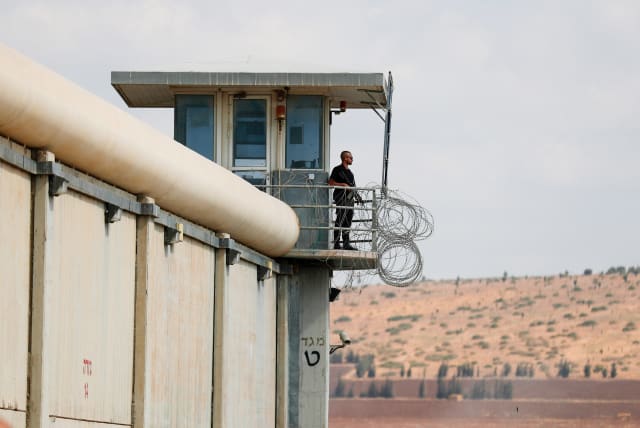Terrorist 'icon' Daqqah ruled ineligible for future early release

The special parole board determined that Daqqah was considered a murderer and a terrorist. Anti-terrorism legislation consequently applied to Daqqah, and he was not eligible for early release.
Walid Daqqah has been ruled ineligible for early release by a special parole board on Monday, after his appeal had been rejected by another regular committee on May 31 and deferred to a panel for terrorists.
Daqqah, the commander of the Popular Front for the Liberation of Palestine (PFLP) cell that tortured and murdered IDF soldier Moshe Tamam in 1984, suffers from bone marrow cancer and requested medical release.
His original 1986 life sentence had been reduced to 37 years, which had expired, but he is serving another two years for involvement in smuggling phones into prison. His legal team argued that he was no longer serving a murder terrorism sentence, and that anti-terrorism legislation that restricted paroles was no longer applicable.
The special parole board determined that Daqqah was considered a murderer and a terrorist. Anti-terrorism legislation consequently applied to Daqqah, and he was not eligible for early release.
Daqqah's family said that he had returned his medication in protest of being unable to contact them, and that they were studying ways to make an appeal.
A terrorist 'icon'

Ortal Tamam, niece of the victim, wrote on Facebook how she had fought against Daqqah's bid for release. She shared that she had written to Prime Minister Benjamin Netanyahu about how the family had not been notified about the release hearings, and how Daqqah was originally slated for a regular parole hearing due to "human error."
According to Tamam, after the regular parole board deferred to a special committee, last Sunday a judge determined that Daqqah did not fall under the anti-terrorism law and he was sent to another regular committee. She said that she appealed to the State Attorney's Office, and it was agreed that a special hearing would be held on Sunday morning.
The Tamam family called on the prime minister to strengthen legislation preventing terrorists from receiving parole. They asked that those punished with life sentences not be released before the age of 80.
Daqqah's cell sought to extract the soldier Tamam from Israel to Syria for bargaining purposes. When this could not be done, Tamam had been brutally tortured and his body mutilated before his execution.
The terrorist has been described by supporters as a political and cultural icon for Palestinians. Daqqah has written books and articles in prison, and earned academic degrees. He fathered one child with semen smuggled out from prison.
Jerusalem Post Store
`; document.getElementById("linkPremium").innerHTML = cont; var divWithLink = document.getElementById("premium-link"); if (divWithLink !== null && divWithLink !== 'undefined') { divWithLink.style.border = "solid 1px #cb0f3e"; divWithLink.style.textAlign = "center"; divWithLink.style.marginBottom = "15px"; divWithLink.style.marginTop = "15px"; divWithLink.style.width = "100%"; divWithLink.style.backgroundColor = "#122952"; divWithLink.style.color = "#ffffff"; divWithLink.style.lineHeight = "1.5"; } } (function (v, i) { });
